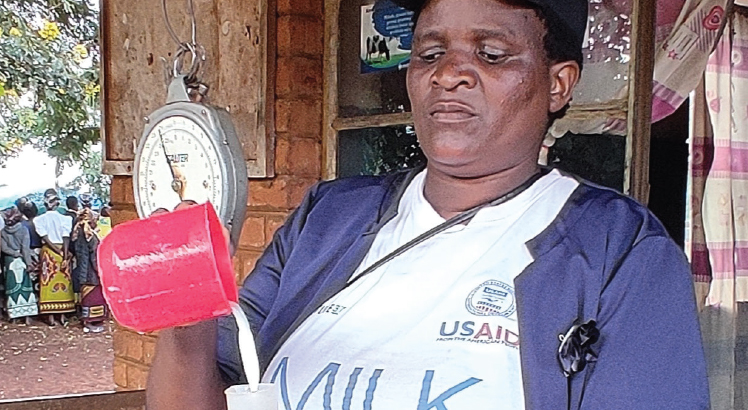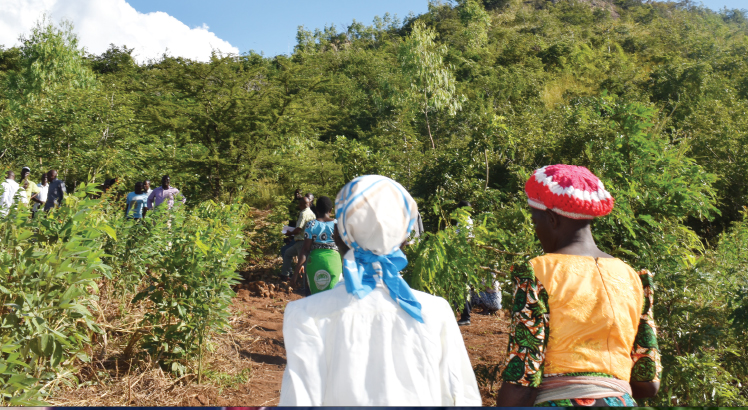On a murky veranda of an ancient building at Mpalo Trading Centre on the outskirts of Ntchisi District perches a makeshift laboratory.
In sight, are all the basic apparatus; testing tubes, chemicals, buckets and a hanging scale.
By the wildest of imaginations, the lab is barely a semblance of technological evolution that is blowing the world away but, in its humbleness, serves its purpose, that of testing milk’s fitness for consumption.
The facility belongs to Mpalo Dairy Farmers Cooperative Society, a group of over 200 smallholder farmers that produces milk at individual level, assembles it and sells in bulks.
Banda tests milk at the makeshift laboratory
Its operational setup could well be the portrait the nation can look up to in its bid to scale up milk production.
“Farmers from several villages are part of this cooperative. They bring their milk to the testing centre. Once it passes, it is packaged for collection,” said Jacinta Banda, the cooperative’s treasurer.
In total, the cooperative produces 1 000 litres daily. It is, at the bare minimum, a small fraction of the national tally which stands at 132 471 litres. However, the cooperative has set its eyes on a bigger target.
“We want to grow our membership in order to quadruple our production,” she said.
The cooperative’s hopes are pinned on a grant from Agricultural Commercialisation (Agcom) Project, a government flagship programme for transforming smallholder agriculture from mostly subsistence to commercial funded by the World Bank.
“Through the grant, we have bought 50 cows which have been distributed to our members. Fifty more will be purchased soon,” said Banda.
The cooperative has been growing its membership through a well-orchestrated system. If one joins, they are given a cow which after it gives birth, passes the offspring to a new member who also follows the same pattern.
“I got a cow when I joined in 2013. After it gave birth, I passed on the calf to a new member. Currently, I have three and my life has transformed. I have a good house, a shop and a farm earned through dairy farming,” said Banda.
John Sitambo, a resident of Katsimphina village, Traditional Authority Kalumo, is a new member of the Mpalo Cooperative. He has already experienced the economic transformation.
“I was given a cow last year. I earn about K40 000 a month through milk sales. Before joining, I didn’t have any stable source of income to meet my family’s needs.
“This money means a lot. I believe my life will transform even more when I secure two more cows. This is my target,” explained the 58-year-old father of five.
To ensure the cows multiply, Mpalo Cooperative has, within its locality, skilled members that conduct artificial insemination.
The Malawi Milk Producers Association (MMPA) says that dairy milk production increased by 8.5 percent to 45.6 million litres valued at K9. 6 billion in 2021.
MMPA president Rodrick Mbango attributes the jump partly to the cooperatives which he says if thoroughly nurtured could lead to more gains in production.
“Mpalo is a good example of how cooperatives can help improve the dairy industry. The farmers feed the cows with the right food and treat them with the right medication.
“The farmers are so passionate and determined to achieve their goals. If we are to increase milk production, we need more cooperatives like this one,” he said during a field day the association organised recently.
Mbango said they are currently supporting the cooperatives to strike deals with grant providers such as Agcom so that they get funding to have more cows and, with that, increased milk.
“All this is to ensure that smallholder farmers have a significant stake in the dairy industry. The reason is that producing milk has lifted a lot of rural families from poverty,” he said.
There are 127 dairy milk cooperatives in the country. Shire Highlands Milk Producers Associations (SHMPA) has 55, Central Region Milk Producers Association 53 while Mpoto Dairy Farmers Association has 19.
Agcom national project coordinator Ted Nankhumwa said they have been disbursing grants to a myriad of dairy cooperatives in a bid to shore up milk production hence enhancing economic gains.
He said, to achieve maximum productivity, they have trained the beneficiaries on business skills and how to look after their animals, according to Agcom website.
Shmpa is among the beneficiary of the grants having recently pocketed a matching grant support of MK1.2 billion from the Agcom project.
However, despite the cooperatives’ colourful prospects, challenges clog their paths to success.
Ntchisi based Beatrice Kalipinde, an agriculture extension development coordinator in the Ministry of Agriculture, points out that smallholder dairy farmers do not have modern storage facilities which leads to losses.
“At Mpalo Cooperative, for example, when a company that buys their milk doesn’t come to collect it that day, the milk goes bad. That loss, sadly, is shouldered by the farmers,” she said.
“What these cooperatives need are refrigerators where they can successfully store the milk,” said Kalipinde in an interview.
In distribution sense, the 132 471 litres per day production means that out of 20 million population, one person gets a pitiful six milligrams which is equal to a mere teaspoon.
That level of production which is 65 percent of required national volumes has, over the years, been forcing the country to supplement the sector with imports, a drain of hard-earned foreign exchange.
However, if the cooperatives are empowered and a couple new ones come into the fold, that is bound to change.
And, there is hope on the horizon as Norfund, a Norwegian Investment Fund which is supporting the local dairy industry, has projected some monumental growth.
“Milk intake (in Malawi) has increased by 18 percent (from 26.5 million liters in 2020 to 31.4 million in 2021). In 2022 an estimated 16 percent growth (36.4 million liters) is expected.
“The number of smallholder farmers delivering milk to the dairy has increased by 11 percent (from 7980 in 2020 to 8890 in 2021), with an estimated 10 percent (9800) growth expected in 2022,” it writes on its website www.norfund.no.
The post Cooperatives transforming lives, dairy industry appeared first on The Nation Online.
 Moni Malawi
Moni Malawi 

